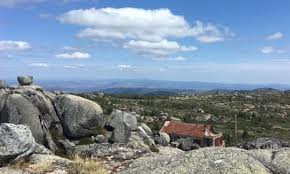Revival of Portugal’s Central Region

Lisbon: I had tired of the Algarve’s expatriate lifestyle, ever-rising costs and a regional development policy that seems to prioritise tourism and retail.
In 2019, I co-founded Rural Properties and moved to Portugal’s Central Region, which already had been attracting attention from those wishing to avoid soaring property prices in Lisbon, Porto and the Algarve.
With the Serra da Estrela mountain range at its core, the region stretches from the Atlantic coast to the Spanish border and is home to stone-built villages, forests, trails, rivers, lakes, historic towns and impressive cities including Coimbra, Viseu and Castelo Branco.
On the point of getting the business operational, along came the Covid-19 pandemic, a period of concern but one fruitfully spent developing networks, undertaking property surveys for those unable to travel and time spent on further research and planning.
Property sales in Portugal slowed to a crawl during the Covid period, but prices held, and the market soon picked up as the country got back on its feet.
The company’s first renovation projects were low-cost village properties ‘not more than 10 kilometres to a market town’. As work progressed and a network of contacts and suppliers were developed, the reaction from locals was surprising. Villagers were delighted that someone was renovating buildings that had been empty, sometimes for 50 years or more, and selling them to newcomers.
The sellers of these unwanted buildings formed a clear demographic with the majority owning several inherited assets and deciding, finally, that there was little point in hanging on to a property that was in danger of losing value through further degradation.
The business model through the pilot stage was for outside investors to fund the purchase and renovation of selected properties and, when the property was sold, share the resulting profit with the company. This went well with early investors happy to fund what they recognised as a good idea.
While the Central Region offers untapped potential, launching and running a property development business here requires local knowledge, patience and flexibility.
Lessons learned to date are that properties in villages take longer to sell than we had planned for, we had not adequately developed the sales side of the business, material costs go up rather than down, labour shortages are endemic, but all against a backdrop of market growth with property prices continuing to rise.
Phase two involved acquiring historic properties in small towns, developing specialist renovation teams with relevant skills, continuing with the initial investment model but altering the profit-share percentage.
A 16th century former church-run hostel was purchased, followed by a mid-1800s townhouse and then two century-old buildings for conversion into apartments. The investment in these projects was close to €900,000 and the business now was being recognised, locally at least, as well-run, solid and enterprising, with a keen eye for a bargain and care taken on design, renovation and marketing.
In addition to these town-centre properties, we bought two farmhouses. One was sold ‘as is’ to a Dutch family and the other is being developed with input from Concepto-Studio, into a luxury second home for a young, Lisbon-based couple.
One of the biggest advantages of Central Portugal is the abundance of inexpensive properties, but it takes experience to know which ones are money pits and which can be renovated with as few expensive surprises as possible.
Documentation for many old properties is out of date, inaccurate or non-existent.
Unlike in many areas of the country, our selected local lawyers, all of whom used to the vagaries of inheritance laws, land borders, zoning, right of preference processes, and at ease dealing with local tax offices, councils and land registries, resolve seemingly intractable anomalies with speed and competence.
The business expanded to sell ‘third-party’ properties in response to several owners who had approached us. Now that we have an estate agency license, old convents, rural estates, a Georgian mansion and other countryside homes have been added to Rural Properties’ ‘for sale’ section. These listings are described in accurate detail, aerial video taken and all are promoted on social media and selected portals.
The core business has developed an additional focus, with the development of apartments in large, historic buildings now a key objective. Apartments have a higher per square metre selling price than houses and are cost-effective to remodel.
For investors in our business, the profit-share funding may continue for larger, one-off projects but for those seeking a steadier, predictable investment income, a range of interest-bearing bonds currently are being developed, an offer that legally is limited to those on the Rural Properties’ newsletter mailing list.
Running a property development business in Central Portugal is no get-rich-quick scheme. It requires patience, specialist legal support, a sound project selection process and an understanding of the local eco-system.
Rural Properties has a clear vision, whether restoring a village cottage, creating apartments in historic town centres, selling third-party properties or working with buyers on designing their ideal rural property. The business is viewed as well placed in this growing market and is contributing, in a small way, to the revival of one of Europe’s most attractive regions.





